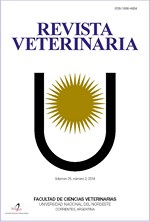Effects of nitrogen fertilization on the production and composition of Cynodon plectostachyus
DOI:
https://doi.org/10.30972/vet.3013899Keywords:
Star grass, nitrogen fertilization, nutritional quality, yield, protein, ureaAbstract
To evaluate how the application of different doses of urea affects the production of dry matter (DM) and nutritional composition of star grass, a trial applying three levels of nitrogen fertilization was conducted: T0: control (0 kg/N/ha), T1: 40.5 kg of N/ha, T2: 81 kg of N/ha. The plot where treatments were applied presents a pasture of C. plectostachyus, with 15 years of implantation and never fertilized, used for direct grazing with high loads. A complete random blocks design was used, with three treatments and three repetitions, applying the fertilizer at the beginning of the work, after a pairing cut. The cuts were made on 23/04, 14/05 and 16/06. From the samples obtained, the DM production was evaluated and at the laboratory, DM, crude protein (CP) and neutral detergent fiber (NDF) were determined. The nitrogenous fertilization of “star grass” produced an increase in DM production of up to 40% for the whole period analyzed, being more than 25% in the first cut. The CP concentration increases approximately 20% with the application of nitrogen at the beginning of autumn, maintaining this effect for 2 months, after which it disappears. The answer was greater for T1. The concentration of NDF was not affected by nitrogen fertilization, although it is observed less NDF in the first cut, for all treatments. The combination of higher concentration of CP and lower NDF, implies an improvement in the nutritional quality of the pasture in the initial post-fertilization period.
Downloads
Downloads
Published
How to Cite
Issue
Section
License
Copyright (c) 2019 R Méndez, J A. Fernández, E A. Yáñez

This work is licensed under a Creative Commons Attribution-NonCommercial 4.0 International License.
Revista Veterinaria (Rev. Vet.) maintains a commitment to the policies of Open Access to scientific information, as it considers that both scientific publications as well as research investigations funded by public resources should circulate freely without restrictions. Revista Veterinaria (Rev. Vet.) ratifies the Open Access model in which scientific publications are made freely available at no cost online.











.jpg)
.jpg)



